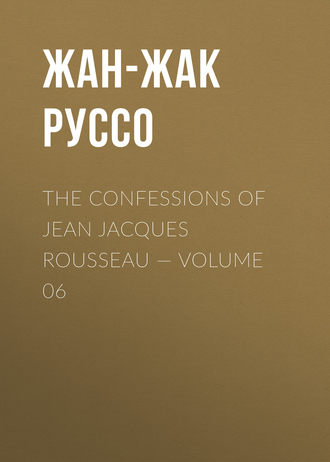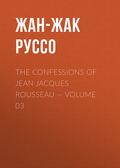
Жан-Жак Руссо
The Confessions of Jean Jacques Rousseau — Volume 06
I have already mentioned that I purchased some books: I did not forget to read them, but in a manner more proper to fatigue than instruct me. I imagined that to read a book profitably, it was necessary to be acquainted with every branch of knowledge it even mentioned; far from thinking that the author did not do this himself, but drew assistance from other books, as he might see occasion. Full of this silly idea, I was stopped every moment, obliged to run from one book to another, and sometimes, before I could reach the tenth page of what I was studying, found it necessary to turn over a whole library. I was so attached to this ridiculous method, that I lost a prodigious deal of time and had bewildered my head to such a degree, that I was hardly capable of doing, seeing or comprehending anything. I fortunately perceived, at length, that I was in the wrong road, which would entangle me in an inextricable labyrinth, and quitted it before I was irrevocably lost.
When a person has any real taste for the sciences, the first thing he perceives in the pursuit of them is that connection by which they mutually attract, assist, and enlighten each other, and that it is impossible to attain one without the assistance of the rest. Though the human understanding cannot grasp all, and one must ever be regarded as the principal object, yet if the rest are totally neglected, the favorite study is generally obscure; I was convinced that my resolution to improve was good and useful in itself, but that it was necessary I should change my method; I, therefore, had recourse to the encyclopaedia. I began by a distribution of the general mass of human knowledge into its various branches, but soon discovered that I must pursue a contrary course, that I must take each separately, and trace it to that point where it united with the rest: thus I returned to the general synthetical method, but returned thither with a conviction that I was going right. Meditation supplied the want of knowledge, and a very natural reflection gave strength to my resolutions, which was, that whether I lived or died, I had no time to lose; for having learned but little before the age of five-and-twenty, and then resolving to learn everything, was engaging to employ the future time profitably. I was ignorant at what point accident or death might put a period to my endeavors, and resolved at all events to acquire with the utmost expedition some idea of every species of knowledge, as well to try my natural disposition, as to judge for myself what most deserved cultivation.
In the execution of my plan, I experienced another advantage which I had never thought of; this was, spending a great deal of time profitably. Nature certainly never meant me for study, since attentive application fatigues me so much, that I find it impossible to employ myself half an hour together intently on any one subject; particularly while following another person's ideas, for it has frequently happened that I have pursued my own for a much longer period with success. After reading a few pages of an author with close application, my understanding is bewildered, and should I obstinately continue, I tire myself to no purpose, a stupefaction seizes me, and I am no longer conscious of what I read; but in a succession of various subjects, one relieves me from the fatigue of the other, and without finding respite necessary, I can follow them with pleasure.
I took advantage of this observation in the plan of my studies, taking care to intermingle them in such a manner that I was never weary: it is true that domestic and rural concerns furnished many pleasing relaxations; but as my eagerness for improvement increased, I contrived to find opportunities for my studies, frequently employing myself about two things at the same time, without reflecting that both were consequently neglected.
In relating so many trifling details, which delight me, but frequently tire my reader, I make use of the caution to suppress a great number, though, perhaps, he would have no idea of this, if I did not take care to inform him of it: for example, I recollect with pleasure all the different methods I adopted for the distribution of my time, in such a manner as to produce the utmost profit and pleasure. I may say, that the portion of my life which I passed in this retirement, though in continual ill-health, was that in which I was least idle and least wearied. Two or three months were thus employed in discovering the bent of my genius; meantime, I enjoyed, in the finest season of the year, and in a spot it rendered delightful, the charms of a life whose worth I was so highly sensible of, in such a society, as free as it was charming; if a union so perfect, and the extensive knowledge I purposed to acquire, can be called society. It seemed to me as if I already possessed the improvements I was only in pursuit of: or rather better, since the pleasure of learning constituted a great part of my happiness.
I must pass over these particulars, which were to me the height of enjoyment, but are too trivial to bear repeating: indeed, true happiness is indescribable, it is only to be felt, and this consciousness of felicity is proportionately more, the less able we are to describe it; because it does not absolutely result from a concourse of favorable incidents, but is an affection of the mind itself. I am frequently guilty of repetitions, but should be infinitely more so, did I repeat the same thing as often as it recurs with pleasure to my mind. When at length my variable mode of life was reduced to a more uniform course, the following was nearly the distribution of time which I adopted: I rose every morning before the sun, and passed through a neighboring orchard into a pleasant path, which, running by a vineyard, led towards Chambery. While walking, I offered up my prayers, not by a vain motion of the lips, but a sincere elevation of my heart, to the Great Author of delightful nature, whose beauties were so charmingly spread out before me! I never love to pray in a chamber; it seems to me that the walls and all the little workmanship of man interposed between God and myself: I love to contemplate Him in his works, which elevate my soul, and raise my thoughts to Him. My prayers were pure, I can affirm it, and therefore worthy to be heard:—I asked for myself and her from whom my thoughts were never divided, only an innocent and quiet life, exempt from vice, sorrow and want; I prayed that we might die the death of the just, and partake of their lot hereafter: for the rest, it was rather admiration and contemplation than request, being satisfied that the best means to obtain what is necessary from the Giver of every perfect good, is rather to deserve than to solicit. Returning from my walk, I lengthened the way by taking a roundabout path, still contemplating with earnestness and delight the beautiful scenes with which I was surrounded, those only objects that never fatigue either the eye or the heart. As I approached our habitation, I looked forward to see if Madam de Warrens was stirring, and when I perceived her shutters open, I even ran with joy towards the house: if they were yet shut I went into the garden to wait their opening, amusing myself, meantime, by a retrospection of what I had read the preceding evening, or in gardening. The moment the shutter drew back I hastened to embrace her, frequently half asleep; and this salute, pure as it was affectionate, even from its innocence, possessed a charm which the senses can never bestow. We usually breakfasted on milk-coffee; this was the time of day when we had most leisure, and when we chatted with the greatest freedom. These sittings, which were usually pretty long, have given me a fondness for breakfasts, and I infinitely prefer those of England, or Switzerland, which are considered as a meal, at which all the family assemble, than those of France, where they breakfast alone in their several apartments, or more frequently have none at all. After an hour or two passed in discourse, I went to my study till dinner; beginning with some philosophical work, such as the logic of Port-Royal, Locke's Essays, Mallebranche, Leibtnitz, Descartes, etc. I soon found that these authors perpetually contradict each other, and formed the chimerical project of reconciling them, which cost me much labor and loss of time, bewildering my head without any profit. At length (renouncing this idea) I adopted one infinitely more profitable, to which I attribute all the progress I have since made, notwithstanding the defects of my capacity; for 'tis certain I had very little for study. On reading each author, I acquired a habit of following all his ideas, without suffering my own or those of any other writer to interfere with them, or entering into any dispute on their utility. I said to myself, "I will begin by laying up a stock of ideas, true or false, but clearly conceived, till my understanding shall be sufficiently furnished to enable me to compare and make choice of those that are most estimable." I am sensible this method is not without its inconveniences, but it succeeded in furnishing me with a fund of instruction. Having passed some years in thinking after others, without reflection, and almost without reasoning, I found myself possessed of sufficient materials to set about thinking on my own account, and when journeys of business deprived me of the opportunities of consulting books, I amused myself with recollecting and comparing what I had read, weighing every opinion on the balance of reason, and frequently judging my masters. Though it was late before I began to exercise my judicial faculties, I have not discovered that they had lost their vigor, and on publishing my own ideas, have never been accused of being a servile disciple or of swearing 'in verba magistri'.
From these studies I passed to the elements of geometry, for I never went further, forcing my weak memory to retain them by going the same ground a hundred and a hundred times over. I did not admire Euclid, who rather seeks a chain of demonstration than a connection of ideas: I preferred the geometry of Father Lama, who from that time became one of my favorite authors, and whose works I yet read with pleasure. Algebra followed, and Father Lama was still my guide: when I made some progress, I perused Father Reynaud's Science of Calculation, and then his Analysis Demonstrated; but I never went far enough thoroughly to understand the application of algebra to geometry. I was not pleased with this method of performing operations by rule without knowing what I was about: resolving geometrical problems by the help of equations seemed like playing a tune by turning round a handle. The first time I found by calculation that the square of a binocular figure was composed of the square of each of its parts, and double the product of one by the other; though convinced that my multiplication was right, I could not be satisfied till I had made and examined the figure: not but I admire algebra when applied to abstract quantities, but when used to demonstrate dimensions, I wished to see the operation, and unless explained by lines, could not rightly comprehend it.
After this came Latin: it was my most painful study, and in which I never made great progress. I began by Port-Royal's Rudiments, but without success; I lost myself in a crowd of rules; and in studying the last forgot all that preceded it. A study of words is not calculated for a man without memory, and it was principally an endeavor to make my memory more retentive, that urged me obstinately to persist in this study, which at length I was obliged to relinquish. As I understood enough to read an easy author by the aid of a dictionary, I followed that method, and found it succeed tolerably well. I likewise applied myself to translation, not by writing, but mentally, and by exercise and perseverance attained to read Latin authors easily, but have never been able to speak or write that language, which has frequently embarrassed me when I have found myself (I know not by what means) enrolled among men of letters.
Another inconvenience that arose from this manner of learning is, that I never understood prosody, much less the rules of versification; yet, anxious to understand the harmony of the language, both in prose and verse, I have made many efforts to obtain it, but am convinced, that without a master it is almost impossible. Having learned the composition of the hexameter, which is the easiest of all verses, I had the patience to measure out the greater part of Virgil into feet and quantity, and whenever I was dubious whether a syllable was long or short, immediately consulted my Virgil. It may easily be conceived that I ran into many errors in consequence of those licenses permitted by the rules of versification; and it is certain, that if there is an advantage in studying alone, there are also great inconveniences and inconceivable labor, as I have experienced more than any one.
At twelve I quitted my books, and if dinner was not ready, paid my friends, the pigeons, a visit, or worked in the garden till it was, and when I heard myself called, ran very willingly, and with a good appetite to partake of it, for it is very remarkable, that let me be ever so indisposed my appetite never fails. We dined very agreeably, chatting till Madam de Warrens could eat. Two or three times a week, when it was fine, we drank our coffee in a cool shady arbor behind the house, that I had decorated with hops, and which was very refreshing during the heat; we usually passed an hour in viewing our flowers and vegetables, or in conversation relative to our manner of life, which greatly increased the pleasure of it. I had another little family at the end of the garden; these were several hives of bees, which I never failed to visit once a day, and was frequently accompanied by Madam de Warrens. I was greatly interested in their labor, and amused myself seeing them return to the hives, their little thighs so loaded with the precious store that they could hardly walk. At first, curiosity made me indiscreet, and they stung me several times, but afterwards, we were so well acquainted, that let me approach as near as I would, they never molested me, though the hives were full and the bees ready to swarm. At these times I have been surrounded, having them on my hands and face without apprehending any danger. All animals are distrustful of man, and with reason, but when once assured he does not mean to injure them, their confidence becomes so great that he must be worse than a barbarian who abuses it.
After this I returned to my books; but my afternoon employment ought rather to bear the name of recreation and amusement, than labor or study. I have never been able to bear application after dinner, and in general any kind of attention is painful to me during the heat of the day. I employed myself, 'tis true, but without restraint or rule, and read without studying. What I most attended to at these times, was history and geography, and as these did not require intense application, made as much progress in them as my weak memory would permit. I had an inclination to study Father Petau, and launched into the gloom of chronology, but was disgusted at the critical part, which I found had neither bottom nor banks; this made me prefer the more exact measurement of time by the course of the celestial bodies. I should even have contracted a fondness for astronomy, had I been in possession of instruments, but was obliged to content myself with some of the elements of that art, learned from books, and a few rude observations made with a telescope, sufficient only to give me a general idea of the situation of the heavenly bodies; for my short sight is insufficient to distinguish the stars without the help of a glass.
I recollect an adventure on this subject, the remembrance of which has often diverted me. I had bought a celestial planisphere to study the constellations by, and, having fixed it on a frame, when the nights were fine and the sky clear, I went into the garden; and fixing the frame on four sticks, something higher than myself, which I drove into the ground, turned the planisphere downwards, and contrived to light it by means of a candle (which I put in a pail to prevent the wind from blowing it out) and then placed in the centre of the above—mentioned four supporters; this done, I examined the stars with my glass, and from time to time referring to my planisphere, endeavored to distinguish the various constellations. I think I have before observed that our garden was on a terrace, and lay open to the road. One night, some country people passing very late, saw me in a most grotesque habit, busily employed in these observations: the light, which struck directly on the planisphere, proceeding from a cause they could not divine (the candle being concealed by the sides of the pail), the four stakes supporting a large paper, marked over with various uncouth figures, with the motion of the telescope, which they saw turning backwards and forwards, gave the whole an air of conjuration that struck them with horror and amazement. My figure was by no means calculated to dispel their fears; a flapped hat put on over my nightcap, and a short cloak about my shoulder (which Madam de Warrens had obliged me to put on) presented in their idea the image of a real sorcerer. Being near midnight, they made no doubt but this was the beginning of some diabolical assembly, and having no curiosity to pry further into these mysteries, they fled with all possible speed, awakened their neighbors, and described this most dreadful vision. The story spread so fast that the next day the whole neighborhood was informed that a nocturnal assembly of witches was held in the garden that belonged to Monsieur Noiret, and I am ignorant what might have been the consequence of this rumor if one of the countrymen who had been witness to my conjurations had not the same day carried his complaint to two Jesuits, who frequently came to visit us, and who, without knowing the foundation of the story, undeceived and satisfied them. These Jesuits told us the whole affair, and I acquainted them with the cause of it, which altogether furnished us with a hearty laugh. However, I resolved for the future to make my observations without light, and consult my planisphere in the house. Those who have read Venetian magic, in the 'Letters from the Mountain', may find that I long since had the reputation of being a conjurer.
Such was the life I led at Charmettes when I had no rural employments, for they ever had the preference, and in those that did not exceed my strength, I worked like a peasant; but my extreme weakness left me little except the will; besides, as I have before observed, I wished to do two things at once, and therefore did neither well. I obstinately persisted in forcing my memory to retain a great deal by heart, and for that purpose, I always carried some book with me, which, while at work, I studied with inconceivable labor. I was continually repeating something, and am really amazed that the fatigue of these vain and continual efforts did not render me entirely stupid. I must have learned and relearned the Eclogues of Virgil twenty times over, though at this time I cannot recollect a single line of them. I have lost or spoiled a great number of books by a custom I had of carrying them with me into the dove-house, the garden, orchard or vineyard, when, being busy about something else, I laid my book at the foot of a tree, on the hedge, or the first place that came to hand, and frequently left them there, finding them a fortnight after, perhaps, rotted to pieces, or eaten by the ants or snails; and this ardor for learning became so far a madness that it rendered me almost stupid, and I was perpetually muttering some passage or other to myself.
The writings of Port-Royal, and those of the Oratory, being what I most read, had made me half a Jansenist, and, notwithstanding all my confidence, their harsh theology sometimes alarmed me. A dread of hell, which till then I had never much apprehended, by little and little disturbed my security, and had not Madam de Warrens tranquillized my soul, would at length have been too much for me. My confessor, who was hers likewise, contributed all in his power to keep up my hopes. This was a Jesuit, named Father Hemet; a good and wise old man, whose memory I shall ever hold in veneration. Though a Jesuit, he had the simplicity of a child, and his manners, less relaxed than gentle, were precisely what was necessary to balance the melancholy impressions made on me by Jansenism. This good man and his companion, Father Coppier, came frequently to visit us at Charmette, though the road was very rough and tedious for men of their age. These visits were very comfortable to me, which may the Almighty return to their souls, for they were so old that I cannot suppose them yet living. I sometimes went to see them at Chambery, became acquainted at their convent, and had free access to the library. The remembrance of that happy time is so connected with the idea of those Jesuits, that I love one on account of the other, and though I have ever thought their doctrines dangerous, could never find myself in a disposition to hate them cordially.







